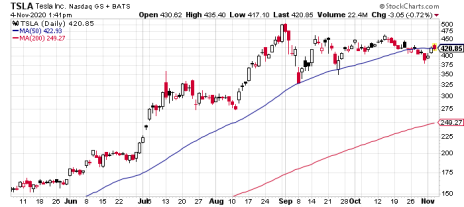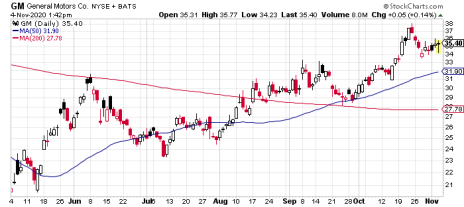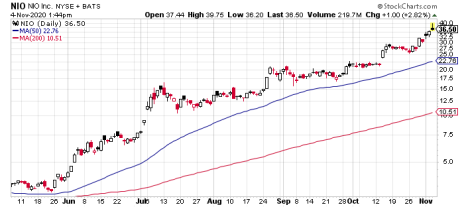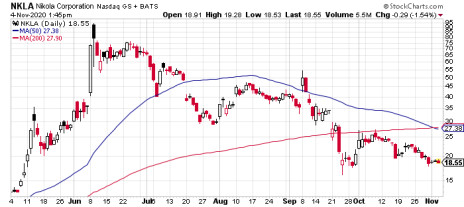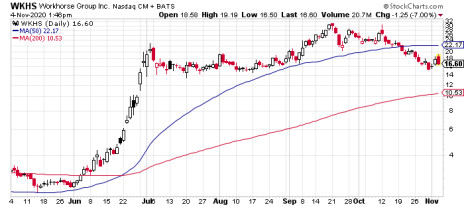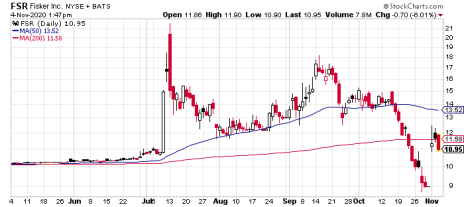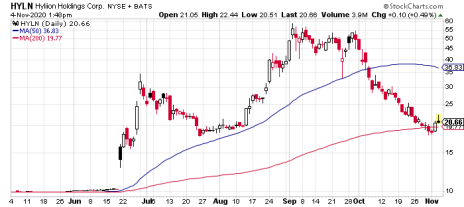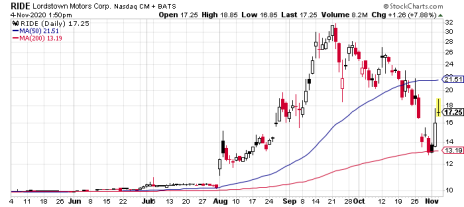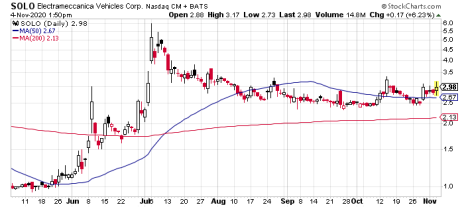Electric vehicle stocks are hot, as growing numbers of investors come to recognize the major shift going on in the industry, both in the U.S. and abroad. Electric vehicles are more efficient, better for the environment, deliver better performance, and cost less to maintain. So let’s look at the electric vehicle stocks — presented in order of market capitalization—and see which ones might deserve a spot in your investment portfolio.
Electric Vehicle Stock #1: Tesla (TSLA)
The king of the hill delivered 139,300 vehicles in the third quarter from its gigafactories in California and China and is building two more gigafactories in Berlin and Austin. Third quarter revenues were $8.77 billion, up 39% from the year before, while EPS was $0.76 per share, up 105% from the year before, marking the company’s fifth consecutive profit. Investor expectations are very high for the company; the market capitalization is $400 billion! And the chart looks quite healthy, consolidating in a stable pattern after zooming from a low of 36 in June of 2019 to a high of 500 in September. My readers have owned it since late 2011, and I’m still telling them to hold on tight.
Electric Vehicle Stock #2: General Motors (GM)
Everyone knows General Motors—but what’s exciting to investors today is the possibility that good old GM might become one of the leaders of the electric vehicle revolution. GM plans to spend $20 billion by 2025 to launch a range of EVs powered by new low-cost, lithium-ion Ultium batteries (predicted to reduce battery cell costs to under $100 per kilowatt-hour). GM also recently entered a partnership with Nikola (see below); as part of the agreement, GMC will build Nikola’s Badger truck using its Ultium batteries and Hydrotec fuel cells. Then there’s GMC’s newly unveiled all-electric Hummer truck, billed as the world’s first all-electric “super truck” (first year production is already pre-sold) plus a just-announced $2 billion plan for six new U.S. production sites. Plus the stock is cheap, selling at a PE of just 8—and the chart has positive momentum. GM’s market capitalization is $51 billion.
[text_ad]
Electric Vehicle Stock #3: Nio (NIO)
A few years ago, China offered massive subsidies to jump-start the country’s electric vehicle industry—and the result was hundreds of home-grown contenders! But those subsidies have since been reduced, and what’s left today are the cream of the crop, like Nio, which makes “premium smart electric vehicles” for the Chinese market. Second-quarter revenues were $526 million, up 140% from the year before, and the third quarter (results will be released November 17) saw deliveries hit 12,206, up 154% from the year before. There are no profits yet, but all trends—including the stock chart—are good. Nio’s market capitalization is $35 billion.
Electric Vehicle Stock #4: Nikola (NKLA)
Taking Mr. Tesla’s first name, Nikola is a Utah-based startup with dreams of building electric semi-trucks powered by hydrogen fuel cells. Technically, the idea has a lot of merit; the challenge is overcoming the established fossil-fuel-centric order. In the meantime, noting the appetite for Tesla’s Cybertruck, the company is taking reservations for its own (non-hydrogen) electric pickup truck—the Badger—which is far more conventionally styled than Elon Musk’s vehicle. And it convinced GM, which will build the Badger, to take $2 billion of stock as part of their partnership. Nikola’s market capitalization is $7.2 billion. Newly public this year, the stock’s chart shows some heavy buying in May and June as all that news came out, but short-sellers threw water on the fire and the stock has been cooling off since. In my mind, the company has some major obstacles to surmount (it has no revenues yet), but success is possible.
Electric Vehicle Stock #5: Workhorse (WKHS)
Born from an old GM business unit, taken over by Navistar, and then acquired by AMP Electric Vehicles, which changed the name, Workhorse is currently manufacturing electric delivery vehicles in partnership with Ryder (and others) at a plant in Indiana. With a market capitalization of $1.9 billion and a positive chart, it’s attractive.
Electric Vehicle Stock #6: Fisker (FSR)
CEO Henrik Fisker has a legacy of designing strikingly beautiful vehicles (for BMW, among others), but out on his own, while he’s produced some very expensive cars, he’s not yet made a profit at it, nor quite succeeded (yet) in making cars in volumes to serve the mass market. But that may change with the Fisker Ocean, an SUV that’s billed as “The World’s Most Sustainable Vehicle,” which features a solar roof, recycled carpeting, and vegan interior among other attractions. The initial reveal is scheduled for the Los Angeles Auto Show in May 2021, with volume production beginning in 2022—but you can reserve a car now. As for the stock, FSR came into being a month ago through a reverse merger and here’s the chart—young and crazy. The company has a market capitalization of $610 million.
Electric Vehicle Stock #7: Hyliion Holdings (HYLN)
Targeting the semi-truck market, Hyliion has a full-electric and a hybrid diesel-electric, but is not actually manufacturing yet. The company’s market capitalization is $505 million, and the chart is going the wrong way—though it may have bottomed at 20.
Electric Vehicle Stock #8: Lordstown Motors (RIDE)
A child of sorts of Workhorse, Lordstown plans to use the old GM factory to build light-duty electric trucks for fleet owners, emphasizing the lower maintenance costs of electric vehicles. With a market capitalization of $495 million, and a chart that’s not strong, it’s not attractive today.
Electric Vehicle Stock #9: ElectraMeccanica (SOLO)
With a market capitalization of just $175 million, we’re in small-cap territory here, where risk is even higher—and we’re talking about a small electric car as well. In fact, the Solo seats only one person—and has only three wheels! Currently imported from China, the Solo’s price is $18,500, but the company’s plan is to open an assembly plant in either Arizona or Tennessee—and drop prices as scale grows. Going forward, the company is also taking pre-orders for a beautiful electric roadster that looks like a vintage Porsche convertible, but the price is $125,000! As for the stock, it’s low-priced and neither strong nor weak.
Note: The next three companies are private, but still worth knowing about.
Lucid Motors (Private)
Having raised $1 billion from private investors, Lucid is targeting Tesla’s flagship Model S sedan with its high performance sedan and the early results are very impressive, with a price, $69,900, that’s close to Tesla’s. You can’t buy one yet, but you can pre-order. However, it’s worth noting that today Tesla gets 90% of its revenue from its lower-priced mass-market Model 3 and Model Y vehicles.
Rivian (Private)
Started by RJ Scaringe in 2009 (six years after Tesla), Rivian is based in Michigan, the traditional home of U.S. truck-makers, and it’s trucks that Rivian will be making. With nearly $3 billion invested by the likes of Ford, T.Rowe Price, and Amazon (which has ordered 10,000 electric vans), these will range from plain vanilla delivery vehicles to “electric adventure vehicles.” You can pre-order now.
Bollinger Motors (Private)
Founded in 2016 and located in Michigan, Bollinger plans to make utilitarian, high-performance off-road electric vehicles (a pickup and an SUV). Aesthetic design is minimal, and the prices will be high, so these vehicles won’t serve the mass market, but they may fill a niche—and you can reserve one now. Also, following in the footsteps (tire tracks) of Rivian, the company has introduced an electric delivery van.
[author_ad]

